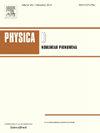Group-convolutional extended dynamic mode decomposition
IF 2.9
3区 数学
Q1 MATHEMATICS, APPLIED
引用次数: 0
Abstract
This paper explores the integration of symmetries into the Koopman-operator framework for the analysis and efficient learning of equivariant dynamical systems using a group-convolutional approach. Approximating the Koopman operator by finite-dimensional surrogates, e.g., via extended dynamic mode decomposition (EDMD), is challenging for high-dimensional systems due to computational constraints. To tackle this problem with a particular focus on EDMD, we demonstrate – under suitable equivariance assumptions on the system and the observables – that the optimal EDMD matrix is equivariant. That is, its action on states can be described by group convolutions and the generalized Fourier transform. We show that this structural property has many advantages for equivariant systems, in particular, that it allows for data-efficient learning, fast predictions and fast eigenfunction approximations. We conduct numerical experiments on the Kuramoto–Sivashinsky equation and a - spiraling wave system, both nonlinear partial differential equations, providing evidence of the effectiveness of this approach, and highlighting its potential for broader applications in dynamical systems analysis.
群卷积扩展动态模态分解
本文探讨了利用群卷积方法将对称性整合到库普曼算子框架中,用于分析和有效学习等变动力系统。由于计算的限制,用有限维替代方法逼近Koopman算子,例如通过扩展动态模态分解(EDMD),对于高维系统来说是具有挑战性的。为了解决这个问题,特别关注EDMD,我们证明-在系统和可观测值的适当等方差假设下-最优EDMD矩阵是等变的。也就是说,它对状态的作用可以用群卷积和广义傅里叶变换来描述。我们表明,这种结构性质对于等变系统具有许多优点,特别是,它允许数据高效学习,快速预测和快速特征函数近似。我们对非线性偏微分方程Kuramoto-Sivashinsky方程和λ-ω螺旋波系统进行了数值实验,提供了该方法有效性的证据,并强调了其在动力系统分析中更广泛应用的潜力。
本文章由计算机程序翻译,如有差异,请以英文原文为准。
求助全文
约1分钟内获得全文
求助全文
来源期刊

Physica D: Nonlinear Phenomena
物理-物理:数学物理
CiteScore
7.30
自引率
7.50%
发文量
213
审稿时长
65 days
期刊介绍:
Physica D (Nonlinear Phenomena) publishes research and review articles reporting on experimental and theoretical works, techniques and ideas that advance the understanding of nonlinear phenomena. Topics encompass wave motion in physical, chemical and biological systems; physical or biological phenomena governed by nonlinear field equations, including hydrodynamics and turbulence; pattern formation and cooperative phenomena; instability, bifurcations, chaos, and space-time disorder; integrable/Hamiltonian systems; asymptotic analysis and, more generally, mathematical methods for nonlinear systems.
 求助内容:
求助内容: 应助结果提醒方式:
应助结果提醒方式:


